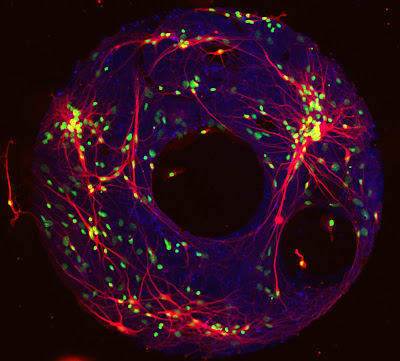 |
Memory cell networks by Vishwanathan, Zeringue, & Bi (via Neuro Images) |
A small selection of the many wonderful autism-related blogposts I had the pleasure of reading in 2011:
Diagnosing the DSM: Diagnostic Classification Needs Fundamental Reform
2013 will see the release of DSM 5, the latest version of the official guidelines for diagnosing "mental disorders". The preliminary draft was released in 2010 and includes the radical and controversial proposal to merge autistic disorder, Asperger syndrome, and PDD-NOS into a single category of "Autism Spectrum Disorder".
On the Dana Foundation website, Steven Hyman, a member of the DSM-5 task force, discussed the history and limitations of the DSM approach. Although not specifically about autism, the issues Hyman raises are extremely relevant. He finishes with this:
"Whatever the ultimate approach to the DSM-5, it is critical that the scientific community escape the artificial diagnostic silos that control so much research, ultimately to our detriment."So far as autism research is concerned, I couldn't agree more.
Freeways, autism and correlation versus causation
As Emily Willingham recently pointed out, it seems that virtually every aspect of modern life has at some time been linked to autism. Indeed, you'd be forgiven for not really caring.
In one of the more highly publicized studies of 2011, Volk and colleagues reported that living within 309 metres of a freeway was associated with an increased risk of autism. While it's tempting to conclude (as some people did) that air pollution from traffic causes autism, interpreting such epidemiological data is fraught with difficulties. David Gorski of Science Based Medicine offered, not only a pointed critique of Volk et al.'s study and several alternative explanations, but also some valuable insights into his "love-hate relationship" with epidemiology.
Split brains, autism, and schizophrenia
Autism is complicated. It's clear that it is in large part genetic. However, the more we learn about autism genetics, the more complex the picture becomes. Genetic variations linked to autism don't always lead to autism and are often linked to other disorders such as schizophrenia, epilepsy, or intellectual disability.
On his Wiring the Brain blog, Kevin Mitchell looked at attempts to piece together what role one such gene, DISC1, actually plays in neurodevelopment and how variations might sometimes lead to a failure to connect the right and left hemispheres of the brain. It's a fascinating read, not least for the "final note".
The obsessive joy of autism
November saw the second official "Autistics Speaking Day" - an opportunity for people with autism to educate everybody else about what it's actually like to be autistic and the challenges of being autistic in a non-autistic world. As Corina Becker, who set the ball rolling in 2010 pointed out,
"If people really want to understand autism, they should be listening to Autistic people".While it's important to remember that the autistic experience isn't necessarily the same for everyone, reading first-hand accounts certainly lends a different perspective and new insights. The Autism and Empathy blog is a particularly fine example of this, challenging the popular "theory" that people with autism lack empathy.
But for me, the most eye-opening first-hand account from 2011 came from Julia Bascom in Shift Journal, where she spoke of the up-sides of autism:
"Neurotypical people pity autistics. I pity neurotypicals. I pity anyone who cannot feel the way that flapping your hands just so amplifies everything you feel and thrusts it up into the air... I pity anyone who is so restrained by what is considered acceptable happiness that they will never understand when I say that sometimes being autistic in this world means walking through a crowd of silently miserable people and holding your happiness like a secret or a baby, letting it warm you as your mind runs on the familiar tracks of an obsession and lights your way through the day."I don't pretend to understand autism and I'm not sure whether I (or anyone else for that matter) ever will. But this post brought me a step closer.
The last-placing winner
From Autism and Oughtisms. My favourite post of 2011.
Happy New Year.
Further reading:
- Autism Speaks Top 10 Autism Research Achievements of 2011
- Simons Foundation Autism Research Initiative: Looking back on 2011
- Thinking Person's Guide To Autism: 2011: The TPGA Year in Review
- Left Brain Right Brain: Around the blogosphere: January 8 2011